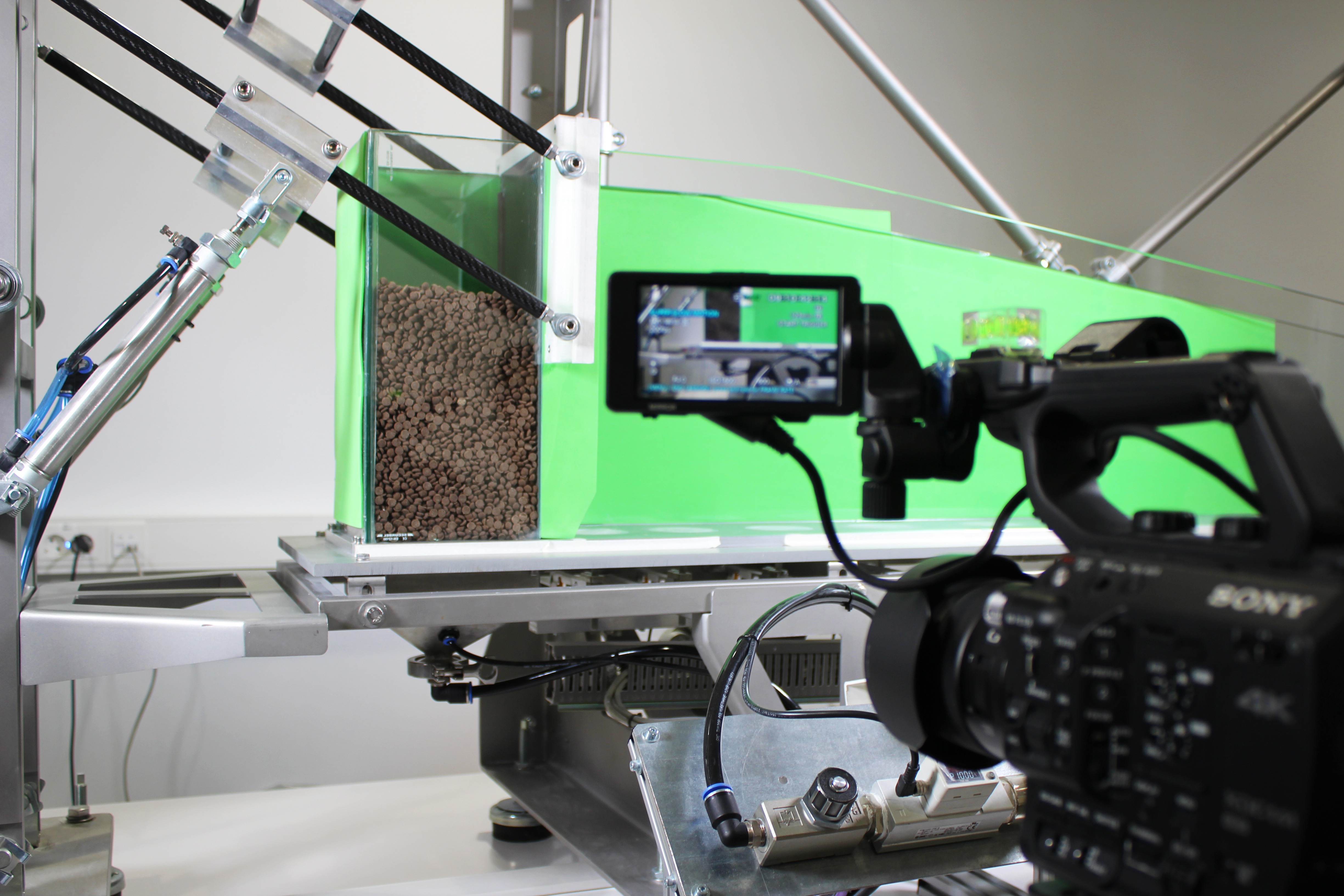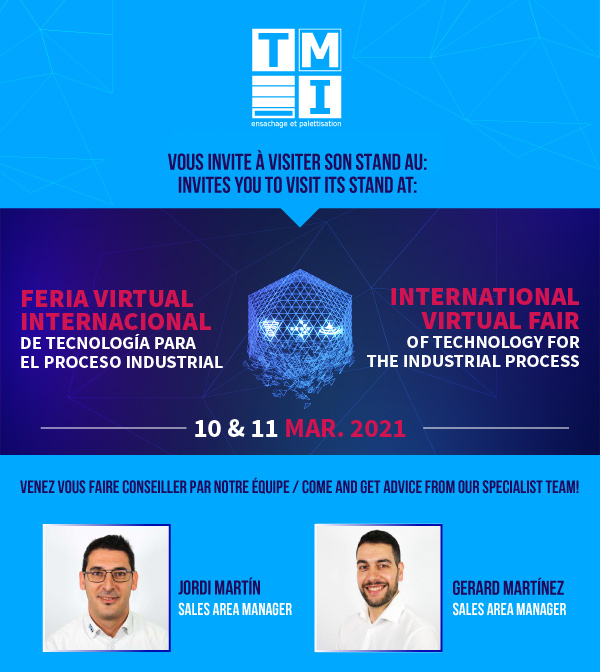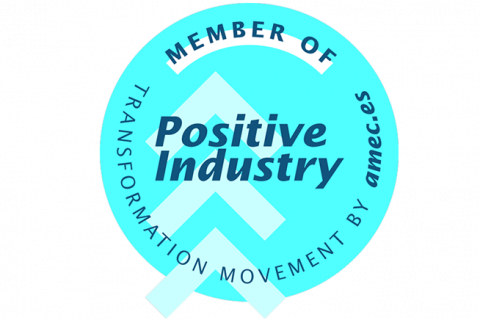
ADDITIVE MANUFACTURING, IIoT and VIRTUAL REALITY: OUR COMMITMENT TO INDUSTRY 4.0
December 20, 2021
Everyone’s talking about digital transformation; it’s a challenge which, now more than ever, industries and companies of all sizes are having to take on. In this article, we’ll look at the steps TMI has been taking on the road to Industry 4.0.
TMI offers customised solutions to meet the bagging and palletising requirements of its customers, who come from a wide range of sectors and have products with diverse characteristics. At a management level, this implies a certain degree of complexity.
Within this context, for a company defined by its open capacity for innovation and process improvement, like TMI, Industry 4.0 is a godsend.
WHAT IS INDUSTRY 4.0?
The main aim of the transformation is to move to smarter and more efficient production processes by digitalising factories. This approach to industrial processes affects production mechanisms and the value chain, enabling machines to exchange information in real-time so that manufacturing processes become more visible and controllable and decision systems become more autonomous and data-driven. Ultimately, this all leads to improved flexibility in production chains.
This process of optimisation focuses on 3 fundamental pillars:
- Improving processes, by enhancing the efficiency of employees, the materials used, energy consumption, etc.
- Improving product performance, including enhancements in quality and adaptability, and the consistency of those two aspects.
- Creating new value, which involves generating new features and business models that operate within the circular economy.
In short, everything goes through some type of enhancement, but this in itself presents us with another obstacle: you can’t improve something you can’t measure. Therefore, measurement and digitalisation tools become a critical part of the process.
But, how do we achieve this much-talked-about digitalisation?
STAGES OF DIGITALISATION
According to the “Industry 4.0 Maturity Index” study published by Acatech, the German Academy of Technical Sciences, companies today are still tackling the challenge of creating the fundamental conditions needed to implement Industry 4.0, whose basic requirements revolve around computerisation and connectivity.
COMPUTERISATION
This is the first requirement and provides the basis of digitalisation. In this stage, different information technologies are used in isolation from each other. This stage is already well advanced in most companies and is primarily used to perform repetitive tasks more efficiently.
CONNECTIVITY
The isolated deployment of information technology is replaced by connected components. Widely used business applications are all connected to each other and mirror the company’s core business processes. Parts of the operational technology (OT) systems provide connectivity and interoperability, but full integration of the IT and OT layers has not yet occurred.
VISIBILITY
Consists of creating a digital shadow of the company. Sensors enable processes to be captured from beginning to end with large numbers of data points. This makes it possible to keep an up-to-date digital model of factories at all times. We refer to this model as ‘the company’s digital shadow’, and it can help show what's happening in the company at any given moment so that management decisions can be based on real data.
TRANSPARENCY
The company focuses on understanding why something is happening to later use this understanding to produce knowledge by means of root cause analyses. To do this, it has to identify and interpret interactions in the digital shadow, and the captured data must be analysed by applying engineering knowledge, which will support complex and rapid decision-making.
PREDICTIVE CAPACITY
Once it has reached this stage, the company is able to simulate different future scenarios and identify the most likely ones. As a result, companies can anticipate future developments so that they can make decisions and implement the appropriate measures in good time.
ADAPTABILITY
It allows a company to delegate certain decisions to IT systems so that it can adapt to a changing business environment as quickly as possible.
SMART FACTORIES NEED SMART WORKERS
One aspect of digitalisation that cannot be overlooked is training and the human factor: successful implementation of the stages described above relies heavily on having a human team that is prepared to adopt new work methodologies that will make them more agile.
In the Industry 4.0 paradigm, the work team must be considerably more agile, cohesive and coordinated at all times, and initiative and self-management skills become vital. This is where new work methodologies and ‘Agile’ tools come into play, with multidisciplinary teams seeking maximum operational precision through clear and effective communication to save time and anticipate any changes that might arise during the course of a project.
INDUSTRY 4.0: TMI’S COMMITMENT
We are a highly technological company with a team of 30 engineers from different work areas: electrical, mechanical, automation, etc. These engineers interact in an agile way to be open to the constant flow of information that comes with Industry 4.0. Ensuring day-to-day integration can sometimes be challenging, but we remain steadfast in our commitment to maintaining this constant flow of knowledge and tools.
It is with this mindset that TMI has embraced the following concepts and integrated them into its processes and products:
1. ADDITIVE MANUFACTURING MEANS SIMPLIFICATION
TMI specialises in product customisation - the reality faced by each of our clients demands it, and, as a result, we manufacture machines that can comprise around 1,000 parts or more. If we expand that to a whole packaging line, which can include a bagging machine, a dosing system, a palletising system and a wrapping system, we’re looking at 5,000 parts per installation as a minimum.
Due to their high degree of customisation, many of these parts are unique, one-off pieces rather than being manufactured in a series. How, then, do we simplify the manufacturing process of this vast quantity of parts to improve in terms of costs, masses, mechanics, etc.? The answer is additive manufacturing.
Additive manufacturing, commonly known as 3D printing, is a constantly advancing technology that reduces the waste, cost, manufacturing time and intermediate processes, like producing tools, involved in the production of customised components. It has allowed the task of making complex parts that used to require multiple manufacturing processes (machining, laser-cutting, metalwork, various treatments, ...) to be simplified to an almost unsurpassable level.
2. IIoT MEANS KNOWLEDGE
IIoT stands for Industrial Internet of Things. Although related to the Internet of Things (IoT), it’s a somewhat different concept because, in addition to pursuing the interconnection of all the electronic parts of a system, it also seeks to ensure that they, and the processes they’re involved in, achieve maximum efficiency.
Currently, most of TMI's machines have integrated sensors that collect information on their efficiency and display it on a screen to assist the operator. This is known as OEE, and it’s a TMI standard that we believe to be vital, because it provides essential knowledge for both the user and the manufacturer of the machine.
Data acquisition is one of the advantages of IIoT: it contributes to decision-making based on quality information and opens up new ways of predicting what maintenance will be required or how regularly spare parts will need to be ordered.
3. VIRTUAL REALITY MEANS SECURITY
One of the great challenges of manufacturing customised lines is its complexity: TMI works with diverse sectors with very different requirements and products with a range of different behaviours. Consequently, our projects involve a high level of innovation, and innovation means doubts.
Fortunately, we can now use virtual reality to address them: it allows us to anticipate, and this is invaluable in the design process. Being able to see a machine or a line and interact with it allows us to visualise its dimensions and how they affect safety, ergonomics and operation.
FROM SCIENCE-FICTION TO REALITY: A REAL-WORLD EXAMPLE
To demonstrate how virtual reality can be applied to the design process of a packaging line, let’s take a look at how TMI helped a large global food manufacturer with a project that was critical for its business and its future.
What were the customer's expectations?
- Improve productivity
- Change the packaging to move the target from B2C to B2B
- Optimise energy consumption in all their industrial processes
- Reduce the environmental impact of the packaging, eliminating the cardboard boxes the bags were previously placed in.
It was a made-to-measure project from start to finish, which entailed increased risk, demanding deadlines, and a complex solution with high-level requirements.
TMI turned to virtual reality to simulate the line and share the design with the client to get a real feel for their expectations and see if both companies were on the same page.
This interaction with a fictional reality prior to manufacture gave us several advantages:
- We were able to put all the critical aspects of the project on the table and reach an agreement.
- Both parties felt more secure and confident in the project.
- We were able to simulate the technicians' working environment in advance: all the people involved in manufacturing the line (designers, electricians, technicians...) were able to familiarise themselves with it. This gave them prior knowledge of the order in which the components had to be assembled, how to do it, how to access the multiple parts, etc.
IN CONCLUSION
The tools that come with Industry 4.0 are neither a utopia nor are they only applicable to large multinationals or huge-scale projects: SMEs can also benefit from using them, albeit one step at a time.
TMI, LEADING IN RESEARCH AND BASIC SCIENCE
March 26, 2021
On 26 February 2021, Dr. Joel Torres Serra defended his doctoral thesis “Granular flow characterisation towards an enhanced bulk feeder selection” developed in TMI within the framework of the "Industrial Doctoral Students" programme.

During 2014-2019, Joel Torres, PhD student, developed a basic science project to identify the best dosing system to be used in bagging systems. The thesis was carried out at TMI as part of the "Industrial Doctoral Students" programme organised by the Barcelona School of Civil Engineering of the Polytechnic University of Catalonia. TMI was the first company in Lleida to host an Industrial Doctorate student and to promote an engineering project based on this research.
Joining the programme arose from the need to classify product typologies according to their behaviour in determining the flowability of the bulk solid product. The purpose was to create a database that can be used to determine the best dosing system for TMI's bagging equipment on the basis of the characterisation of each product.
From the research carried out during the doctorate, the TMI laboratory, ILERLAB, was created: Samples of all our customers' products are currently tested in this laboratory, right from the commercial definition phase. The combination of tests in the lab and in the testing facility offers maximum guarantees in project definition.
This Doctoral Thesis is a further step in the research and development of the company, which can now offer maximised advice, basing solutions on empirical facts, thus achieving a 360º service.
From TMI we warmly congratulate Dr. Joel Torres for his work, his excellent results and the defence of his thesis.
Visit TMI at EXPOSOLIDOS 2021!
January 28, 2021
Next Stop ➡ EXPOSOLIDOS - International Exhibition for the Technology and Processing of Solids (10&11 MAR. 2021 / 09h-19h)

EXPOSOLIDOS is the leading trade fair in southern Europe specializing in the handling and processing of solids, bulk materials, dry powder, semi solids and solids-liquid separation. The presence of the leading brands in EXPOSOLIDOS become the ideal place to analyze and compare solutions to the technological needs of visitors. EXPOSOLIDOS is an event designed for business, networking and to reach specific solutions to the needs of industries related with solids, bulk materials, dry powder, semisolids and separation solid-liquid requirements.
Jordi Martín and Gerard Martínez, TMI Area Managers, will be at the stand to give you their best advice about bagging, palletizing & wrapping lines.
On the day of the fair you can register and access our stand through this link: https://lnkd.in/d_3UjiJ
For more info visit: www.exposolidos.com
TMI RECEIVES THE PYME 2020 AWARD
October 09, 2020
The award is granted by the Chamber of Commerce, Banco Santander and Grupo Segre and is aimed at SMEs.
We are pleased to announce that we have been awarded the Premio Pyme 2020 prize (SME of the Year 2020) by the Chamber of Commerce of Lleida and Banco Santander, with the collaboration of the SEGRE Group. The award acknowledges the efforts and contribution to regional economic development of SMEs, the capacity to generate employment, as well as their internationalisation and responsible management.
Thanks to our experience developing solutions for bagging and palletising, we were able to win the candidacy, beating the 27 other companies that competed for the award this year. There were 17 companies competing in the previous edition, and Josep Ramón París, the general secretary of the Chamber of Commerce, highlighted this "notable" increase.
The jury recognised TMI's commitment to internationalisation. Seven out of every ten euros invoiced by the company are generated by exports, and we currently operate in more than 40 countries around the world. In addition, since 2017, we have a subsidiary in Mexico. They also considered the "modern facilities" located in the Camí dels Frares industrial estate in Lleida, which were exlarged two years ago, as well as the total number of workers.
We would like to congratulate the other candidate companies for their great work and participation: CLANSER SA, Grupo Consist, S.A., Starloop Studios, ATLAS energia and ROURE OPTICS SL.
We are honoured to receive this Award - thank you all!
TMI PRESENTS ITS NEW CORPORATE IMAGE WITH A NEW WEBSITE, CATALOGUE AND VIDEO
October 09, 2020
In this year 2020, when TMI celebrates its 20th anniversary, the company has decided to renew its image to clearly reflect its human values, while presenting itself as a leading manufacturer of bagging, palletizing and stretch-wrapping technology.
In this year 2020, when TMI celebrates its 20th anniversary, the company has decided to renew its image to clearly reflect its human values, while presenting itself as a leading manufacturer of bagging, palletizing and stretch-wrapping technology.
The main concept behind the campaign is therefore the fact that only in close cooperation with customers, distributors and suppliers worldwide it is possible to reach the highest peak, namely excellence.
All members of TMI's staff are aware that, for the successful completion of a project, the client's objectives must be achieved and that, for this purpose, active cooperation is the key. From this perspective, we have chosen to present a natural setting where a father and daughter are the main characters. Because, just as in industrial machinery projects, when it comes to the mountains, it is important to work with experienced people who can guide you along the paths and in times of uncertainty. And at the same time, it is important to have that freshness and drive to get the best results. For all these reasons, the main characters of this new image unite experience and enthusiasm to achieve their goal: the top of the mountain.
Of course, there is no lack of technological details, nor a renewal in the way the products are presented on the new website, which now has technical data sheets to download, and many more reference images.
Another factor to highlight is the improved access to quotations for each solution and the easy contact with the company.
With this change TMI expects to be able to reach a larger audience in a more effective and clearer way than before.
EVERYTHING WILL BE FINE! // COVID-19
August 11, 2020
From TMI we would like to inform you that we are closely following the evolution of the situation regarding the spread of COVID-19. Despite the scenario is changing day by day, our commitment is to operate safely and as normal to ensure a proper service.

From TMI we would like to inform you that we are closely following the evolution of the situation regarding the spread of COVID-19. Despite the scenario is changing day by day, our commitment is to operate safely and as normal to ensure a proper service.
For this reason, following the indications of the Spanish Government and with the aim of protecting the health and well-being of our workers, clients, suppliers and partners, we have established several preventive safety measures.
In TMI we will continue working to ensure the continuity of our services of production, customer attention and technical support that we provide daily. We will continue assisting you telematically, during the usual working hours, and our production staff will continue their tasks with the maximum hygiene and safety measures.
We also want to inform you that all our staff is doing well and that no cases of COVID-19 infection have been detected.
We are confident that we will soon be able to continue with our normal activity, and we will keep you informed of any changes.
In the meantime, do not hesitate to contact us via email or telephone +34 973 25 70 98 and we will answer all your questions.
TMI team.

TMI Técnicas Mecánicas Ilerdenses SL in the framework of the ICEX Next Program, has been supported by ICEX and co-financed by the European ERDF fund. The purpose of this support is to contribute to the international development of the company and its environment.

TMI, en el marco del Ministerio de Industria y Turismo, ha desarrollado un proyecto titulado 'Implementación de mejoras integrales a los procesos, calidad y trazabilidad de TMI', subvencionado por dicho ministerio y financiado por la Unión Europea a través de Next Generation EU, en el marco de la convocatoria de apoyo financiero a planes de innovación y sostenibilidad en el ámbito de la industria manufacturera 2022.

Company
Industries
Services
Address
Polígono Industrial Camí dels Frares,
C/ Alcarràs, parc 66 - 25190 - Lleida · SPAIN Tel.
+34 973 25 70 98







